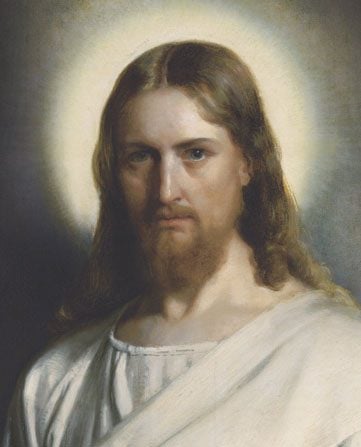
(LDS Media Library)
I have already hinted in this chapter at some of the differences between the Qur’anic version of biblical stories and the earlier Hebrew accounts. It will be recalled that, according to the Qur’an, Abraham and Ishmael came down to west central Arabia and there founded the Meccan Ka’ba, asking that they might be given a posterity that “submits” to God (i.e., is “Muslim”).[1] This incident is totally unknown to the Old Testament, but it serves to give ancient Arabia— which had previously seemed an utter blank spot in the record of God’s dealings with humankind—a part in the divine scheme of world history, a role that extends back even beyond the coming of the Prophet Muhammad. (Some non-Latter-day Saint scholars have claimed that the Book of Mormon served the same purpose for the Americas.) As I have noted, it is intriguing that the Qur’an rarely argues for this visit by Abraham and Ishmael, but simply refers to it as a story already well known to both believers and nonbelievers alike in early Arabia.
Far more important is the different view of Jesus taken by the Qur’an. It is not merely the stories about Jesus’ boyhood that are different. Tales about his speaking in the cradle and about his making a bird out of clay and then breathing life into it and watching it fly away are well known from the so-called “infancy gospels” that circulated in early Christianity.[2] No, the distinction between Islam and Christianity concerning the place of Jesus is much wider and much more significant than any issue raised by such stories.
First, Islam denies that Jesus died upon the cross. The Jews are quoted in the Qur’an as saying, “‘We slew the Messiah, Jesus Son of Mary, the Messenger of God’—yet they did not slay him, neither crucified him, only a likeness of that was shown to them… And they slew him not of a certainty—no indeed; God raised him up to Him.”[3] A similar position, claiming that Jesus did not actually suffer under Pontius Pilate but only seemed to do so, is associated in Christian history with a heresy known as “docetism.” (The name of the movement comes from the Greek verb dokeo, meaning “to seem.”) The Christian theological tendency that went under that title argued that Jesus, as God, was too exalted a being to suffer pain and that the real Christ, therefore, must have been removed from the scene before the actual suffering began. Other Christians rejected it as a heresy because there cannot be an atonement if there was no death. But where Christians would regard such an implication as fatal for the docetist view, Muslims would not be troubled at all. Indeed, the Qur’an denies the possibility of intercession by one soul for another.[4]
Islam has consistently denied the divinity of Christ. “If the Lord of Mercy had a son,” Muhammad is commanded to say, “I would be the first to worship him.”[5] But this the Qur’an explicitly and repeatedly denies. “How should He have a son when He had no consort?” it asks.198[6] But this commonsensical question—the same that was often asked by the late Elder LeGrand Richards of the Council of the Twelve—is used not to establish the possibility that God the Father has a wife, but the impossibility of his being a father. “He (exalted be the glory of our Lord!) has taken no wife, nor has He begotten any children.”[7] Probably the strongest statement of this principle occurs toward the end of the Qur’an-which means, most likely, that it came as one of the earliest chapters:
Say: “He is God, One,
God, the Everlasting Refuge,
who has not begotten, and has not been begotten,
and equal to Him is not any one.”[8]
The language of the Qur’an is often quite vigorous on this subject. There can be no doubt about its opinion of the importance of the issue.
And they say, “The All-merciful has taken unto Himself a son.” You have indeed advanced something hideous!
The heavens are well-nigh rent of it and the earth split asunder, and
the mountains well-nigh fall down crashing
for that they have attributed to the All-merciful a son; and it
behooves not the All-merciful to take a son.
None is there in the heavens and earth but he comes to the All-merciful
as a servant.[9]
The Qur’an does not deny the concept of the Virgin Birth; in fact, it speaks emphatically of “Mary,…who preserved her chastity and into whose womb We breathed of Our spirit.”[10] But this does not make Jesus the son of God, according to Islamic views. Rather, it simply makes Jesus the only human being in history born to only one parent; to use technical language, he represents a case of parthenogenesis. Jesus has a special place in Islamic thought and in Islamic expectations for the last days. But he is definitely not, according to Islamic doctrine, the Son of God. Indeed, the Qur’an represents him as denying this himself:
Then God will say: “Jesus, son of Mary, did you ever say to mankind: ‘Worship me and my mother as gods beside God?’”
“Glory to You,” he will answer, “how could I say that to which I have no right? If I had ever said so, You would surely have known it. You know what is in my mind, but I cannot tell what is in Yours. You alone know what is hidden. I spoke to them of nothing except what You bade me. I said: ‘Serve God, my Lord and your Lord.’”[11]
[1] 2:125 -29; 14:35 -37.
[2] 3:46; 5:110; 19:29-33; 3:49; 5:110.
[3] 4:157 58 (Arberry).
[4] 2:48; 17:15; 21:28; 35:18; 39:7, 44; 53:38-39.
[5] 43:81. 198.6:101. 199′ 72:3.
[6] 6:101.
[7] 72:3.
[8] This is the entire text of sura 177 of the Qur’an.
[9] 19:88-93Arberry, compare 2:116; 10:68-69; 17:111; 18:4-5; 19:35; 21:26-29; 23:91; 25:2; 39:4; 43:59.
[10] 66:12.
[11] 5:116-17.












